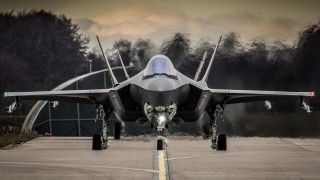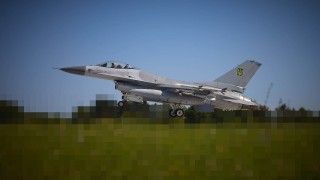- WIADOMOŚCI
East Front News #27: NATO Nuclear Deterrence, Norwegian F-35 Land in Poznan
East Front News is a weekly newsletter summarizing the past week’s most important events concerning security and the situation in the Central and Eastern Europe region. It includes original opinions and comments, along with key news items significant from a Polish perspective. If you would like to receive this newsletter, please sign up by clicking .

Photo. Defence24
NATO's Nuclear Deterrence Against Russia
NATO’s nuclear deterrence remains a cornerstone of its defence strategy amid increasing threats from Russia and other adversarial powers. The Alliance has significantly invested in modernizing both its nuclear and conventional forces, transitioning to advanced platforms like the F-35A aircraft and deploying the upgraded B61-12 nuclear bombs in Europe. These measures are coupled with updated decision-making frameworks and strategic communication to ensure credible deterrence and reduce escalation risks. Russia’s nuclear strategy, characterized by coercion, blackmail, and integration of conventional and nuclear capabilities, poses a direct challenge. Moscow’s nuclear saber-rattling aims to undermine NATO’s unity and deter support for Ukraine but has only solidified the Alliance’s resolve. NATO counters these efforts with a blend of military modernization, collective defence planning, and transparency in its policies, including routine exercises like STEADFAST NOON, which are carefully calibrated to demonstrate capability without provoking conflict.
While NATO remains committed to the goal of a nuclear-free world, it acknowledges that current global conditions, marked by the nuclear expansion of Russia, China, and North Korea, make disarmament unrealistic in the short term. Instead, NATO prioritizes maintaining a credible deterrent while adapting its strategies to the modern multipolar nuclear landscape. The Alliance stresses that its modernization efforts are focused on safety and effectiveness rather than increasing stockpiles, contrasting sharply with Russia’s diversified arsenal and treaty violations. Additionally, NATO strongly opposes the weaponization of space, warning of its catastrophic global implications. Russia’s alleged development of nuclear-armed counterspace systems would not only violate international treaties but also threaten global stability by disrupting vital satellite infrastructure. In this complex security environment, NATO’s unified approach and emphasis on deterrence and defence underscore its commitment to safeguarding Allied security and the rules-based international order. Interview with Jim Stokes, NATO’s Director of Nuclear Policy is here.
F-35 boost Polish Air Defence
As reported on the social media of the 31st Tactical Air Base in Poznań-Krzesiny, Norwegian F-35s landed at the base on Wednesday 8 January. This deployment contributes to NATO Integrated Air and Missile Defence. This is not the first visit of F-35s to Polish bases. Last year, four F-35 Lightning II jets from the United States Air Force supported NATO’s eastern flank. Permanently stationed at the Royal Air Force base in Lakenheath, UK, they began their mission on April 1 at the 32nd Tactical Air Base in Łask, Poland. Since 2022, US, British and Dutch F-35 have been deployed to Poland to support the Polish air defence, and the first time F-35 landed in Poland was in 2019 (in Powidz).
See also

Ślązak OPV Transforms into Gawron Surface Combatant
Polish Ministry of Defence plans to upgrade the ORP Ślązak OPV or patrol corvette. This initiative aims to create a classic surface combatant equipped with missile capabilities to counter air and land targets, while also featuring the ability to operate drones and conduct radar reconnaissance.
Documentation published on 30th December, 2024, by the Armament Agency outlines plans for a thorough modernization of the ORP Ślązak patrol corvette, specifically stating: „retrofitting the ORP Ślązak patrol corvette with weapon systems and additional equipment.” This operation is set to be preceded by preliminary market consultations, which will enable the preparation of procurement specifications and determine the required budget. The Armament Agency has set a tight schedule, giving interested parties until January 17, 2025, to submit the necessary documentation.
Polish Grot Rifle in the Hands of African Rebels
Polish-made MSBS Grot assault rifles have surfaced in the hands of M23 rebels in the Democratic Republic of the Congo (DRC), sparking concerns about the end-use of arms exported to Africa. These rifles, delivered under contracts signed by the Polish Armaments Group (PGZ) in 2022 and 2023, were intended for an unnamed African country, but investigations suggest they reached Rwanda. Rwanda has been accused of supporting M23, a claim it denies, yet evidence, including photos of Rwandan soldiers with Grot rifles, links the nation to the equipment. The controversy highlights challenges in arms control, as Rwanda was expected to ensure these weapons remained within its military. This incident raises questions about the broader risks of arms proliferation in volatile regions and the accountability of end-user agreements.
The resurgence of M23 in 2022 has destabilized eastern DRC, with the group capturing significant territory and committing atrocities against civilians. The Congolese government has struggled to counter these advances, accusing Rwanda of backing the rebels. Meanwhile, the conflict has strained resources needed for other operations, such as combating the Islamic State Central Africa Province (ISCAP), which has launched a new wave of deadly attacks in the region. As violence escalates, there are fears that poorly monitored arms sales could exacerbate the situation, undermining efforts for peace and security. For Poland, this incident underscores the importance of stringent oversight in arms export agreements to prevent misuse and safeguard its reputation as an emerging supplier to Africa.
Ukrainian counter-offensive in the Kursk Oblast
From October 2024, Russia, reinforced by North Korean recruits, advanced in the Kursk Oblast. On 5 January 2025, Ukrainian forces struck north-east of Sudja in the Kursk Oblast. Both the Kremlin’s and Kyiv’s actions are motivated by a desire to control as much territory as possible before Donald Trump is officially sworn in as President of the United States. Ukraine’s offensive actions and their success are in question as Russian troops are making advances south and south-west of Pokrovsk and north and west of Velya Novoselka. In the face of Ukraine’s offensive actions, there are reports of a December order for 180,000 rounds of 35mm calibre ammunition for self-propelled anti-aircraft guns Gepard, the cost of which will be covered by the German side. In turn, the Swedish Ministry of Defence has announced of $27m to support Ukrainian air defence. The Ukrainian legal system has also been amended with the new year - statutory changes concern the introduction of compulsory three-month military training for all men aged 18-24.
Russian terrorist attack foiled
The Security Service of Ukraine managed to foil an attempted terrorist attack at the entrance to a Ukrainian military building. The incident was planned by Russian special services. Four people were arrested, including a 16-year-old member of Russian intelligence, who was supposed to be the core of the attack and plant a backpack filled with explosives. Importantly, the 16-year-old was not aware that he would die as a result of the explosion. It was established that the detainees did not directly cooperate with each other, but were subordinate to the same Russian superior. Among the others detained was a 19-year-old, whose task was to smuggle the explosives, and the other two participants in the plan were responsible for constructing the charge. The aim of the terrorist attack was to destabilize the socio-political situation in Ukraine, as well as to create a seemingly tense situation in the Defense Forces. The four Russian citizens face life imprisonment and confiscation of property without the possibility of release on bail.
If you would like to receive this newsletter, please sign up by clicking.
East Front News is a weekly newsletter and article on Defence24.com summarizing the past week’s most important events concerning security and the situation in the Central and Eastern Europe region. It includes original opinions and comments, along with key news items significant from a Polish perspective.
Aleksander Olech, PhD & Jakub Palowski, Deputy Ed. in Chief, Michał Górski


















